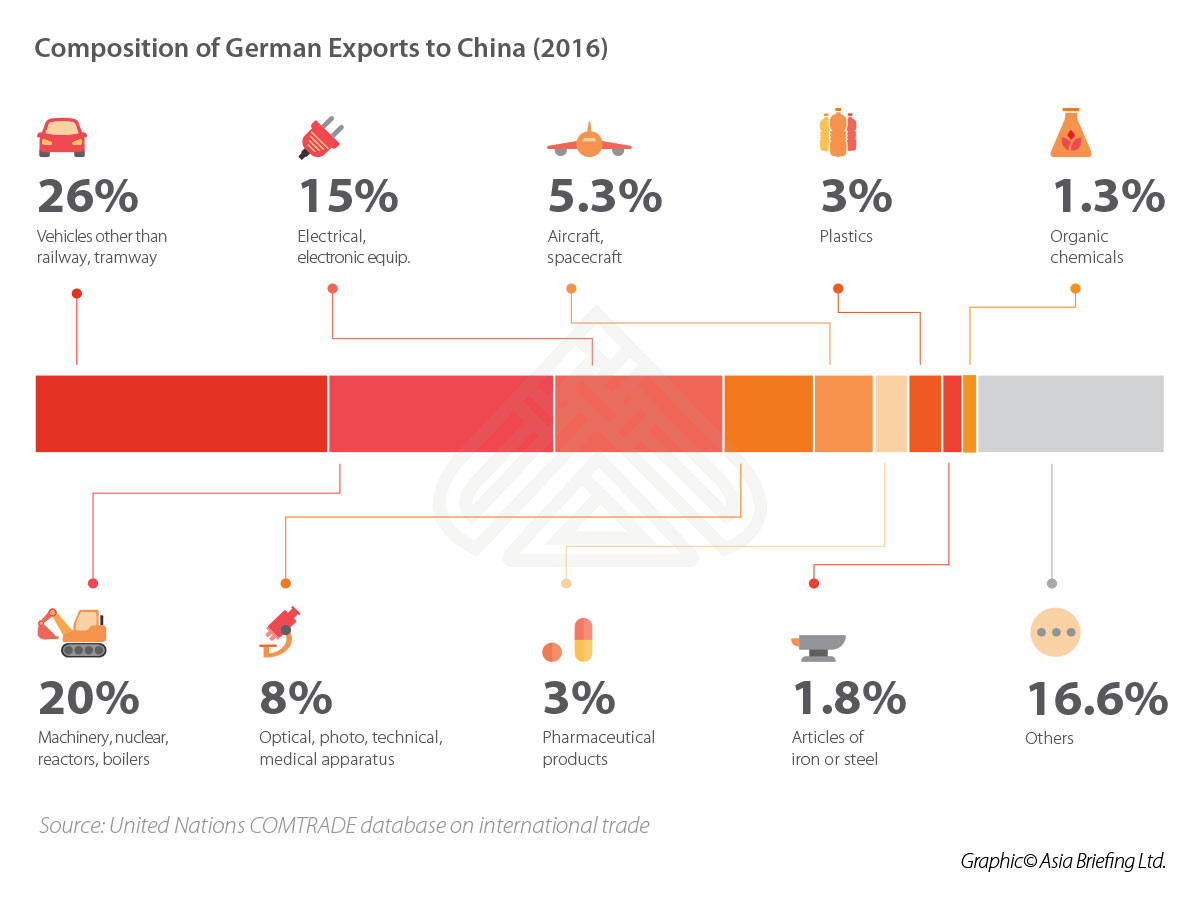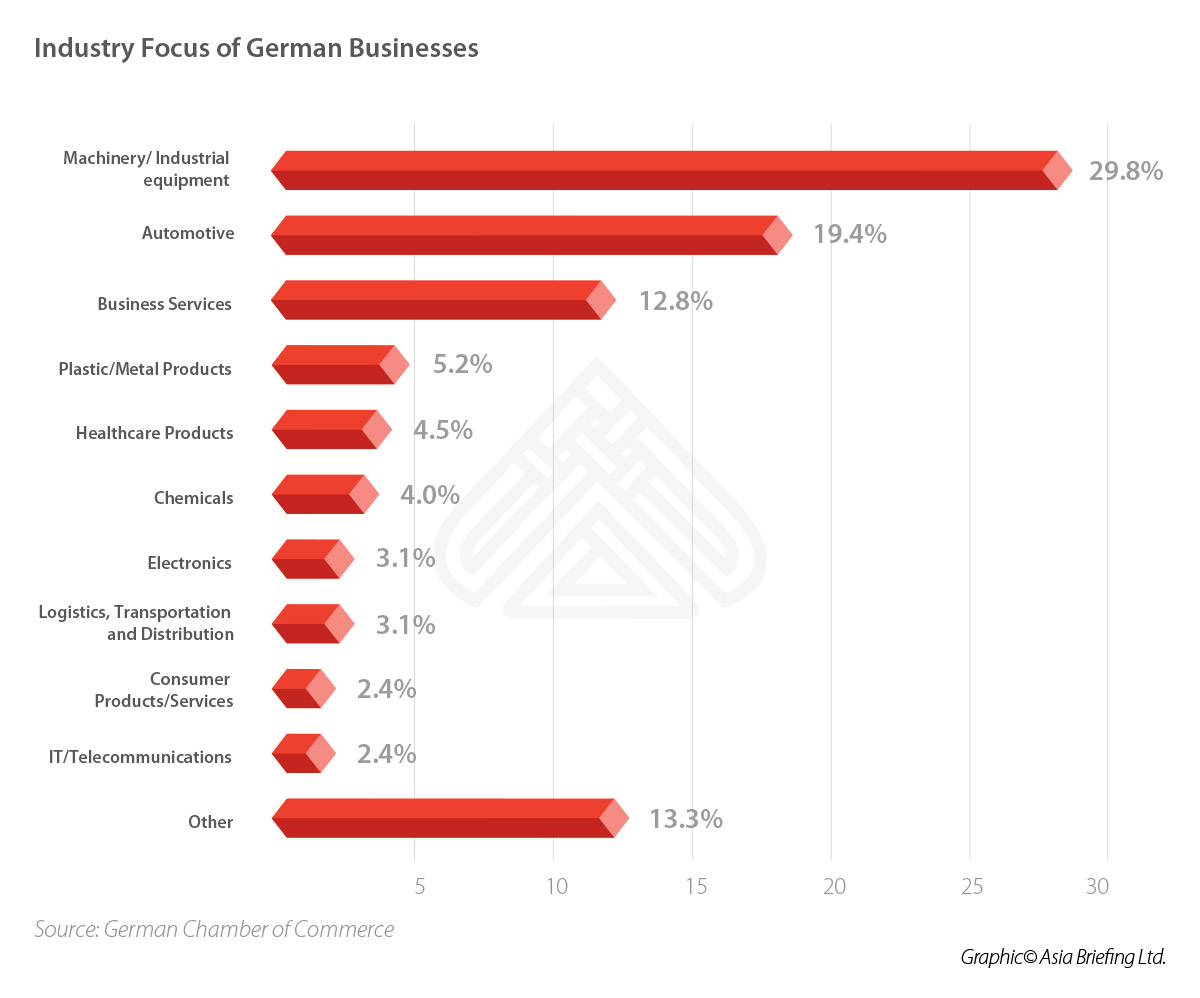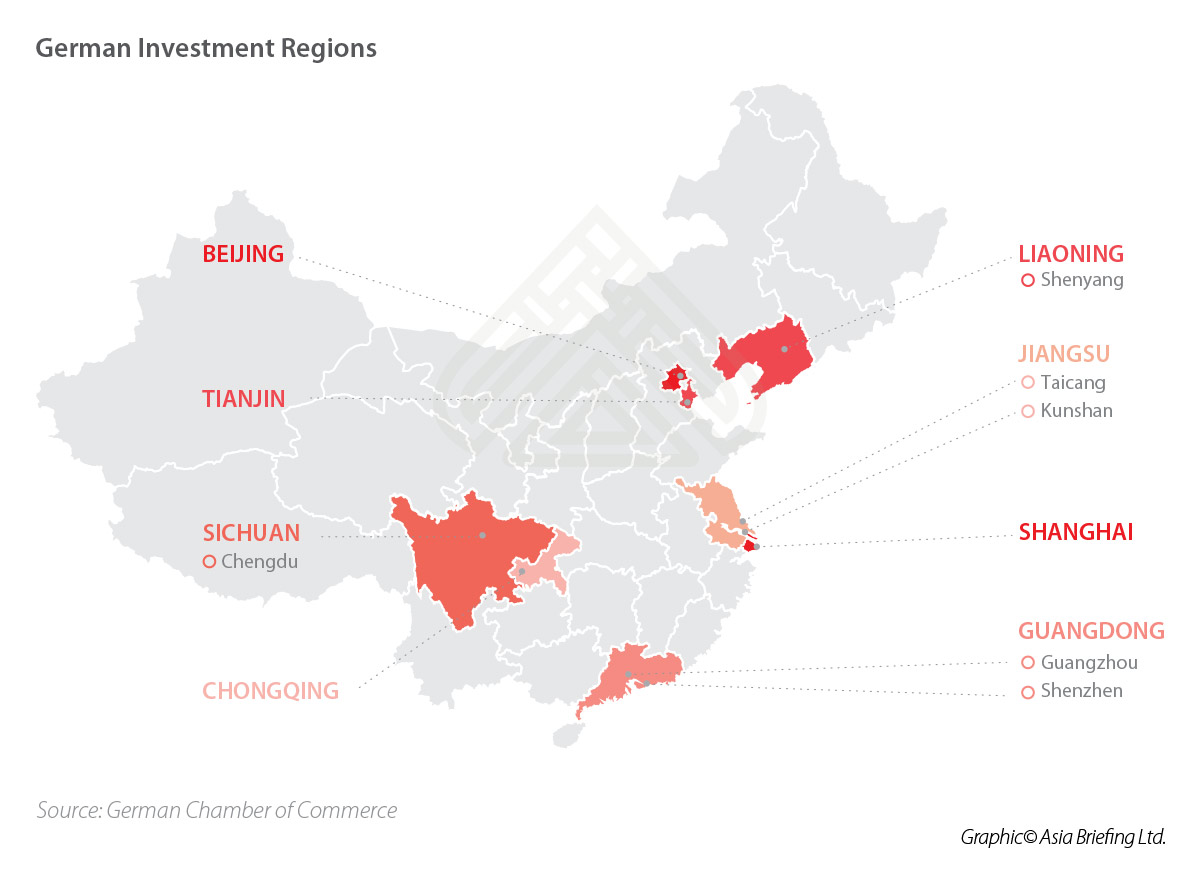China-Germany Relations: Opportunities Emerge as Investment Ties Grow
By I-Ting Shelly Lin
In 2017, China maintained its spot as Germany’s largest trading partner for the second consecutive year.
The two countries moved to a full strategic partnership in 2014, and have since benefited from investments in the areas of trade, technology, and innovation.
After the UK’s decision to leave the EU and the US election of President Trump, China and Germany – as the second and fourth largest economies in the world – have been increasingly called upon to lead on global economic affairs.
China and Germany hosted the last two G20 summits, and both repeatedly stress the need to promote globalization, facilitate investment, and defend free trade.
China’s Belt and Road Initiative (BRI) serves these ambitions, and Germany is viewed as a key European participant of the ambitious project.
Consequently, Sino-German business and economic ties are poised to grow stronger.
![]() RELATED: China-Canada Relations: A New Economic Partnership?
RELATED: China-Canada Relations: A New Economic Partnership?
Investment facilitation through industrial parks
The German and Chinese governments have established a high-level fiscal and financial dialogue mechanism and released the document Program of Action for China-Germany Cooperation in 2014.
Enhancing industrial cooperation toward innovation is a key goal of the joint program, as illustrated in Germany’s “Industrial 4.0” and China’s “Made in China 2025” initiatives.
Sino-German industrial parks fulfill the objectives of these initiatives by facilitating technology incubation and development.
- Sino-German (Shenyang) Intelligent Equipment Manufacturing Park: This is an important hub for intelligent and advanced machinery manufacturing; its partners include global giants such as BMW, Siemens, and BASF.
- Kunshan German Industrial Park: The hub focuses on small and medium-sized enterprises (SMEs), targeting American and European enterprises that offer expertise in high efficiency production, science and technology, environmental protection, and independent branding. Leading industries here are: precision machinery, high-end foods, and logistics.
- Sino-German Small and Medium Enterprises Cooperation Park: It is situated in Pujiang County, Chengdu in Sichuan province. By 2020, the park expects to host over 100 operating German enterprises, which will generate RMB 10 billion in economic value. Aside from the infrastructure, the region’s population of about 100 million provides the necessary labor force required by German enterprises and joint ventures based here. Vocational training in this region to educate local Chinese students to German standards makes the park quite appealing for German investors.
During his visit to Berlin in 2017, Chinese Premier Li Keqiang and German Chancellor Angela Merkel signed cooperation agreements in economy and trade, finance, new-energy vehicles, and artificial intelligence.
In March, this year, the two countries launched 11 innovation platforms for the following sectors: electric vehicles, bioscience, clean water, intelligent manufacturing, and clean energy.
Germany has also agreed to help speed up the negotiation process of the EU-China investment treaty, which, if successful, could jumpstart the signing of the EU-China free trade agreement.
Sino-German trade and investment
Germany’s trade with China increased 35 percent in 2017, totaling US$230 billion, as compared to US$170.2 billion in 2016.
Germany is the largest European investor in technology businesses operating in China, and Chinese businesses also invested over US$2.95 billion in Germany in 2016. That same year, Germany launched more than 300 new projects in China worth US$2.71 billion. By 2017, more than 8,200 German enterprises were operating in China, representing a total investment of US$67.34 billion.
New investment opportunities in China
The highly complementary nature of the Chinese and German economies widens the scope for bilateral investments and trade cooperation.
China has a huge domestic market, established manufacturing ecosystem, sufficient capital, a large skilled labor force, and relatively low R&D costs.
Germany, on its part, is known for its scientific and technological innovation, advanced manufacturing industries, vocational education, and small and medium-sized enterprises.
China’s aspirations to develop a high-tech economy and grow its booming aviation and automobile sectors provide ideal opportunities for German investors, according to the German Chamber of Commerce. However, German companies have a mixed view of China’s ambitious BRI initiative.
According to the German Chamber of Commerce’s 2017 Business Confidence Survey, about 30 percent of German companies operating in China are involved in or are considering their participation in the BRI. At the same time, only one-third of all German companies in China are confident that their investments in this project will have a positive impact on their business.
Most German investment in the BRI is in the automotive and construction sectors, making up almost 40 percent of total investments. The remaining is in sectors such as logistics, energy, business and finance, and transportation.
According to the German Chamber of Commerce, 46 percent of the German companies participating in the BRI do so as subcontractors or suppliers to Chinese companies.
Regions for German investment in China
Taicang, located in Suzhou, in the Jiangsu province of East China, is home to many German companies. The region is known for its ready access to the Yangtze River Delta region, and its large population.
Since August 2016, Taicang has attracted more than 250 small and medium-sized German companies, generating sales revenue of RMB 18.6 billion (US$2.72 billion).
The German Center Taicang, a base of Sino-German cooperation, with its proximity to the resources of Shanghai and Suzhou, prepares businesses operating in the automotive, machine construction, electronics, energy, and consumer products sectors to enter the Chinese consumer market.
According to the aforementioned 2017 Business Confidence Survey, German companies are planning further investment in Jiangsu, Guangdong, Sichuan, and Chongqing.
Tier 1 cities like Shanghai, Beijing, Guangzhou, and Shenzhen also remain popular locations for German investment because of their large populations exhibiting mature consumer behavior.
Challenges facing German investors
Kristine Horbach, International Business Advisory Manager at Dezan Shira & Associates, notes that the biggest challenge for German investors is China’s frequently changing regulatory environment and the make-up of its regional governments.
“Many German companies have developed investment strategies for China over the years but are often forced to change them because of new regulatory or governmental policies they have not previously considered,” Ms. Horbach observed.
German investors also feel threatened by Chinese incursions into their intellectual property rights. Ms. Horbach points out that Germans are very proud of their technology as something that separates the German economy from other economies.
She said, “For a German company to introduce technology into the Chinese market by itself or as part of a joint venture poses an immediate risk that the technology will be unlawfully copied. This causes the German company to lose market share and to consider pulling out their investment.”
The Chinese and German cultures are both highly conservative, and people in both countries enjoy living in a down-to-earth manner in a calm environment. From a business perspective, Ms. Horbach explains, “The Chinese appreciate the straightforward and reliable business acumen and efficiency of Germans; and Germans appreciate the effort, patience, and passion the Chinese exhibit for going the extra mile on business projects, even if the business outcome is zero for them.”
However, the tendency in Chinese business culture for employees to be more submissive, especially with respect to the decisions of supervisors, can lead to inefficient work environments and negative business outcomes in their collaborations with Germans, who are educated to question everything, including managers and colleagues.
Other areas of friction include the China’s strict foreign exchange controls and difficulties in repatriating profits in RMB.
Moreover, Ms. Horbach notes that certain investment restrictions, such as requiring German companies to enter China only through joint ventures or not being allowed to entirely engage in the venture give German companies the feeling of not being supported, especially when no such restrictions are applied to Chinese firms doing business in Germany.
![]() Business Intelligence from Dezan Shira & Associates
Business Intelligence from Dezan Shira & Associates
Looking forward
With respect to how Sino-German economic relations are likely to develop in the next few years, Ms. Horbach believes that it is likely that only German companies with well-planned business investment strategies will be able to establish themselves in China.
Compared to the situation two decades ago, it is now complicated and expensive for German companies to follow the business slogan “Must Commit to China,” which discourages them from more experimental, temporary engagement in China.
However, Ms. Horbach believes that China still offers great opportunities “but no longer as a production landscape with a cheap workforce that allows price dumping.” Wage and price increases in China have caused a number of German companies to redirect their focus on ASEAN countries or India.
Nevertheless, Ms. Horbach suggests that despite these problems, it is crucial for German investors to seize new opportunities presented by China’s huge combined market for consumer and technological products.
And with China-US hostilities ratcheting up in recent months, German companies can take on a stronger leadership role in the Middle Kingdom.
The successes of the China-Germany relationship can serve as a model not just for many medium-sized powers, but even for the United States.
In this relationship, Germany adheres to its principles of freedom and democracy, while at the same time productively cooperating with and avoiding hostility with China.
Their strengthening bilateral ties show how the two countries are able to effectively address their differences by respecting each other’s core interests and concerns, helped in no small measure by a degree of overlapping economic interests.
About Us
China Briefing is published by Asia Briefing, a subsidiary of Dezan Shira & Associates. We produce material for foreign investors throughout Asia, including ASEAN, India, Indonesia, Russia, the Silk Road, and Vietnam. For editorial matters please contact us here, and for a complimentary subscription to our products, please click here.
Dezan Shira & Associates is a full service practice in China, providing business intelligence, due diligence, legal, tax, accounting, IT, HR, payroll, and advisory services throughout the China and Asian region. For assistance with China business issues or investments into China, please contact us at china@dezshira.com or visit us at www.dezshira.com
- Previous Article How Beijing is Making Doing Business Easier
- Next Article China’s New VAT Rates: Prepare for May 1 Transition










